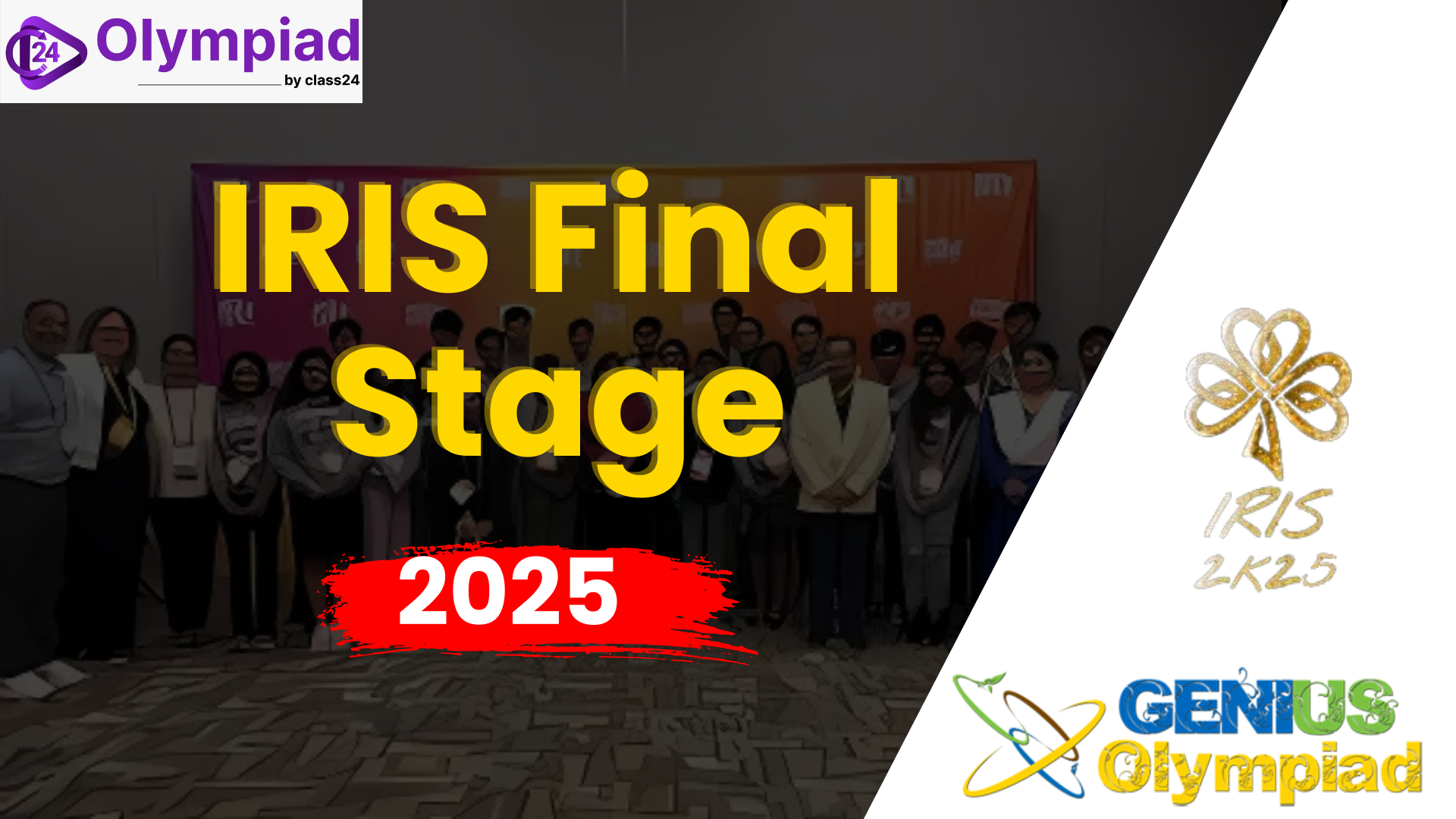
The IRIS Final Stage is a premier pre-college science competition conducted annually in the United States. This renowned event targets students from Grade 5 up to Grade 12, inspiring them to do original research in Science, Technology, Engineering and Mathematics (STEM) and share discoveries. The competition is supported by EXSTEMPLAR Education Linkers Foundation and provides young Indian students with an opportunity to present their innovative ideas on an international platform.
Here, we will explore all the crucial information about the IRIS 2025 Final Stage, such as who is eligible, registration, the process of competing, the schedule, prizes, and how to prepare.
IRIS (Initiative for Research and Innovation in STEM) is a globally recognized science competition for school students. It inspires students to produce research in science and technology and provides them with the opportunity to share their work globally. It follows the example of ISEF by promoting creativity, scientific thought and uniting scientists worldwide.
|
Feature |
Details |
|
Full Name |
Initiative for Research and Innovation in STEM (IRIS) |
|
Organizing Body |
EXSTEMPLAR Education Linkers Foundation |
|
Type |
Pre-College Science Competition |
|
Levels |
School, National, International |
|
Classes Eligible |
5th to 12th |
|
Mode |
Hybrid (Online + Offline) |
|
Final Venue |
United States (for top finalists) |
|
Focus Areas |
Science, Technology, Engineering, Mathematics |
Student-led projects are exhibited at the IRIS fair in various levels, from inside schools to international groups. The ease of participation for Indian students is made possible by DU’s hybrid approach. The winning projects from the national fair are then selected to go on to ISEF.
Students who study in Classes 5 to 12 at recognized Indian schools are eligible for scholarships. Each project must bring new ideas, creativity and be based on solid science. Participating in a team means each team can register up to two players.
This contest supports students from diverse educational settings, including those from rural and government areas. You can enter projects by yourself or as part of a group for joint learning experiences. Projects should relate to one of the official areas of STEM to meet the requirements.
Students attending classes from 5 to 12 in Indian schools can take part.
For the project to succeed, it must be original, novel, and use science as its basis.
A maximum of two individuals can work together on a team.
The program is open to students from all types of schools, including rural and government schools.
There is no limit to how many people can participate in the competition as a team or individual.
The to-do list must include only projects in the STEM categories (such as Science, Technology, Engineering, and Mathematics).
With IRIS, students have a variety of STEM subjects to pick from, depending on what they enjoy or need. The subjects found in STEM are Environmental Science, Physics, Chemistry, Robotics, AI, and similar topics. The organization values done projects across multiple fields to support creativity.
Environmental Science
Biomedical Engineering
Physics and Astronomy
Plant Sciences
Mathematics
Computer Science
Robotics and AI
Energy and Sustainable Design
Chemistry
Behavioral and Social Sciences
When picking a subject, students are guided by what they are interested in and what they wish to do in the world around them. With a variety of categories, everyone’s idea has a place to be recognized. Multidisciplinary projects are also encouraged.
The first step of the IRIS competition is to submit an abstract online. This leads several projects to the IRIS National Science Fair in India, where students present what they did. UK winners are then chosen to represent the country at the finals in the USA which are held alongside other international contests like ISEF. There are many steps involved in the IRIS competition, making it organized.
Submitting an Abstract: Students prepare and submit a brief report about their research online.
National Finalist Selection: Entrants with the best results are picked and invited to join the national science fair.
IRIS National Science Fair: The Finalists of the IRIS National Science Fair present their work to a professional jury in India.
Final Stage in USA: Significant projects are submitted for recognition at the ISEF and other world contests.
At every step, the process focuses on assessing creativity, using a scientific approach and results. The U.S. finals allow Indian students to connect with global innovators. By working through different stages, scientists learn to be confident and professional.
Students who want to apply for IRIS 2025 need to go to the official website and upload their research project abstract. You can apply to BYU-Idaho through their website at no charge. People can begin submitting their work in September, with the closing date set as October 30, 2025.
Step 1: Visit the official IRIS website: irisf.gov.in
Step 2: Click on “Submit Your Project”
Step 3: Register using your details: name, class, school, contact
Step 4: Post your research abstract and all the necessary documents.
Step 5: Wait to receive the outcome and get instructions on what to do next
You do not need to pay any fees and the online forms are straightforward. Students are encouraged to begin working on their project at the right time and remain guided by the abstract requirements. Submissions that are not complete or copied from others are not accepted.
As of now, there is no application fee for participating in the Initiative for Research and Innovation in STEM (IRIS) National Fair. The program is organized by EXSTEMPLAR Education Linkers Foundation and aims to promote and nurture science and scientific research among young Indian innovators. The competition gives students a space to present their science projects and the winners get a chance to attend the International Science and Engineering Fair (ISEF) in the USA.
Application Fee: Participating in IRIS is free, as there is no application cost involved.
Organized by: EXSTEMPLAR Education Linkers Foundation to promote STEM research.
You can find the most recent updates on the official IRIS site: www.irisnationalfair.org
Keep in mind that the scheduled dates are likely based on what happened in the previous years. You can find the most reliable and updated information by checking the IRIS website from time to time.
|
Event |
Tentative Dates |
|
Online Abstract Submission |
July – September 2025 |
|
Shortlisting Announcement |
October 2025 |
|
IRIS National Fair |
December 2025 |
|
Final Stage (USA - ISEF) |
May 2026 |
Record these days on your calendar as important advancements. Make sure your application is submitted by the deadline to be considered for the prize. Finalists from India are provided with the necessary funds for both their travel and lodging in the U.S.
The judges at every stage are made up of experts in science, academia and industry. A well-structured and well-researched presentation is usually easy to notice. How much a student understands and participates is also appreciated by judges.
Originality and Creativity
Scientific Research and Process
Technical Proficiency and Accuracy
Communication and Presentation
Real-world Relevance and Impact
The top winning entries from India are sent to the Regeneron ISEF competition in the United States.
Cash awards, medals, and scholarships
Training or certificates you may have from DST and other national entities
Access to advice and guidance from experts in the world of science
IRIS recognition allows students to take part in more research, receive scholarships and study at top universities. Finalists gain exposure and become representatives for science in their schools and home areas.
IRIS isn’t only a competition—it opens doors to scientific research. Additionally, participants are often offered fellowships and the chance to study at famous universities outside the U.S. It also helps you feel prouder and more confident. The chance to showcase your innovation to people from other countries
Connect with scientists and experts from all over the world.
Enhance problem-solving and communication skills
Provide a starting point for those who want to work in STEM fields.
To make your IRIS project successful, you need to be consistent, clear, and interested in learning more. Be sure your project has a clear objective, a precise hypothesis, and applies to real-life situations. Begin your project as soon as possible to leave time for adjusting and examining your results. Here are some Preparation strategies for IRIS Final Stage 2025.
Pick a subject you are keen on and look into it further.
Keep a journal for your project and record everything you do.
Ask your mentors and teachers for their opinions.
Practice presenting to varied audiences
Look at the winners from past editions of IRIS or ISEF.
The IRIS Final Stage 2025 offers a transformative experience for young minds passionate about science. IRIS’ approach of mentorship and global exposure allows students to have big ideas and find solutions to practical issues.
The content is spot on! It breaks down complex topics into simple, digestible parts. Really helped me understand Rajasthan’s polity and history better. Highly recommended for serious aspirants!
What sets this platform apart is the clarity of explanations and structured study plans. It kept me motivated and on track throughout my prep journey.
Loving the regular updates and current affairs section. Makes revision so easy. The mock tests gave me a real feel of the actual exam!




Leave a Comment